
|
Astronomy Picture Of the Day (APOD)
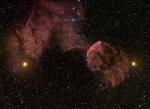 Elusive Jellyfish Nebula
Elusive Jellyfish Nebula
8.04.2004
Normally faint and elusive, the Jellyfish Nebula is caught in the net of this spectacular wide-field telescopic view. Flanked by two yellow-tinted stars at the foot of a celestial twin - Mu and Eta Geminorum - the Jellyfish Nebula is the brighter arcing ridge of emission with dangling tentacles just right of center.
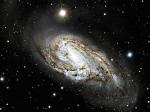 Unusual Spiral Galaxy M66
Unusual Spiral Galaxy M66
7.04.2004
Why isn't spiral galaxy M66 symmetric? Usually density waves of gas, dust, and newly formed stars circle a spiral galaxy's center and create a nearly symmetric galaxy. The differences between...
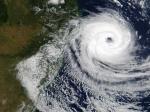 Unusually Strong Cyclone Off the Brazilian Coast
Unusually Strong Cyclone Off the Brazilian Coast
6.04.2004
How did this huge cyclone form? An unusually strong storm -- perhaps the strongest storm in the recorded history of the South Atlantic Ocean -- crossed the coast of Brazil last week. Cyclones this powerful, classified by some as the first ever Category 1 Hurricane, are very rare in the South Atlantic.
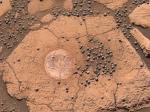 A Berry Bowl of Martian Spherules
A Berry Bowl of Martian Spherules
5.04.2004
How were these unusual Martian spherules created? Thousands of unusual gray spherules, made of iron and rock but dubbed blueberries, were found embedded in and surrounding rocks near the landing site of the robot Opportunity rover on Mars.
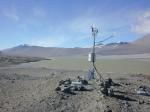 The Lost World of Lake Vida
The Lost World of Lake Vida
4.04.2004
A lake hidden beneath 19 meters of ice and gravel has been found near the bottom of the world that might contain an ecosystem completely separate from our own. In a modern version...
 A Mystery in Gamma Rays
A Mystery in Gamma Rays
3.04.2004
Gamma rays are the most energetic form of light, packing a million or more times the energy of visible light photons. If you could see gamma rays, the familiar skyscape of steady stars would be replaced by some of the most bizarre objects known to modern astrophysics -- and some which are unknown.
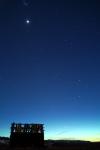 Mercury and Venus in the West
Mercury and Venus in the West
2.04.2004
Doing their part in the ongoing dance of the planets, Mercury and Venus both reached their greatest elongation or maximum apparent distance from the Sun only a few days ago, on March 29th. Eager...
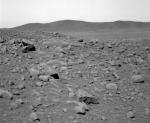 April Fools Day More Intense On Mars
April Fools Day More Intense On Mars
1.04.2004
Today, April 1st, astrophysicists have announced a surprising discovery - April Fools Day is more intense on Mars! Though the discovery is contrary to accepted theories of April Fools Day, researchers note that there are several likely causes for the severe martian April Fools phenomenon.
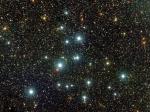 M39: Open Cluster in Cygnus
M39: Open Cluster in Cygnus
31.03.2004
Lying just at the limit of human perception is a picturesque starfield containing one of the larger open clusters on the northern sky. Spanning an angle larger than the Moon, M39's relatively few stars lie only about 800 light years distant toward the constellation of Cygnus.
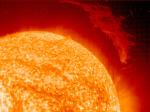 A Prominent Solar Prominence from SOHO
A Prominent Solar Prominence from SOHO
30.03.2004
One of the most spectacular solar sights is a prominence. A solar prominence is a cloud of solar gas held above the Sun's surface by the Sun's magnetic field. Last month, NASA's Sun-orbiting SOHO spacecraft imaged an impressively large prominence hovering over the surface, pictured above.
|
January February March April May June July August September October November December |
|||||||||||||||||||||||||||||||||||||||||||||||||